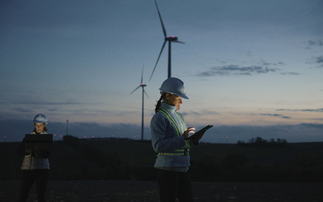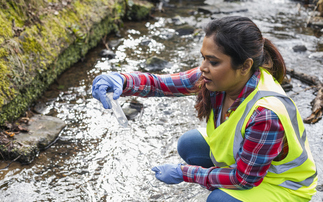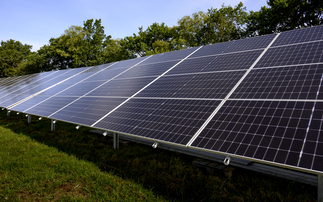David Cameron says cash spread over five years will come out of foreign aid budget as he meets Ban Ki-moon and François Hollande at UN
Almost £6bn of the UK's foreign aid budget will be spent on tackling climate change in poor countries over the next five years, David Cameron has said, as Britain steps up its contributions by 50 per cent to help meet international targets.
The prime minister will unveil the UK's offer at the United Nations general assembly, before crucial international climate change talks in Paris in December where nations are expected to collectively pledge $100bn (£66bn) a year by 2020.
The UK's promise of £5.8bn between 2016 and 2021 is backloaded, so the UK will contribute the most, about £1.87bn, in the target year of 2020. The new commitment is greater than that of the 2011 to 2016 period, for which the UK offered £3.87bn in climate finance through the foreign aid budget.
But campaigners and charities will want to know more detail about how the money is going to be spent and how it affects other international development programmes, which are paid for out of the 0.7 per cent of national income dedicated to foreign aid.
Cameron was to discuss climate change at a working lunch at the UN in New York on Sunday, alongside the secretary general, Ban Ki-moon, and the French president, François Hollande, as world leaders begin to put their 2020 offers of cash on the table.
Before the UN meeting, Cameron said tackling climate change and poverty go together and these would help keep future generations secure. "That's why it is so important that we secure an ambitious, global deal in Paris later this year that keeps our goal of limiting global warming by 2050 to two degrees within reach," he said.
"The UK is determined to play its part, not just by cutting our emissions at home but by providing support overseas to those who need it, particularly the poorest and most vulnerable. That's why we will increase the amount of aid we spend on climate finance over the next five years, helping communities around the world become more resilient to flooding and drought and providing clean, reliable energy.
"That energy not only keeps the lights on, it also improves health and education, spurs economic growth and creates jobs," he added.
The government is aiming to spend 50 per cent of climate finance on adaptation and 50 per cent on mitigation. Typical projects include forestry schemes, flood defences and conversion to solar energy. At the Paris summit, leaders will have to thrash out whether money to help poor nations deal with warming is going to the right places and how any deal is policed.
The conference will also aim to restrict global warming to 2C in order to avoid catastrophic climate change, but the UN's climate chief has warned that pledges submitted by countries so far will fall short of that goal.
Downing Street said it hoped the Paris talks would represent a turning point in the fight against climate change and send out a strong signal for low-carbon industries across the world. However, Britain's support for renewable energy at home has not been so committed in recent years, with the government cutting subsidies for windfarms, solar plants and biomass.
This article first appeared at the Guardian
BusinessGreen is part of the Guardian Environment Network








